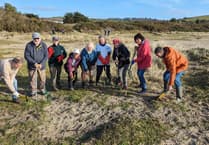This summer looks to be one of the busiest yet for the RSPCA.
As the annual summer peak in calls for hedgehog emergencies combined with the devastating heatwave, the charity are prepared for an influx of emergency calls.
The charity are expecting the numbers for this year’s call to be one of the highest as they reflect on last year’s data.
The most calls the charity received last year were related to sick or weak hedgehogs, which received 2,816 calls, followed by injured animals, 1,513 calls.
In August alone, the RSPCA was answering an average of 23 calls a day about sick and injured hedgehogs.
The staff at the charity’s four wildlife centres were kept busy in 2021, with 2,165 hedgehogs admissions, an average of six hedgehogs a day, rising to 11 a day in August.
Two-thirds of the animals were admitted due to being sick or injured, and around one-third had been orphaned.
RSPCA scientific officer Evie Button said: “Calls to the RSPCA about sick and injured hedgehogs always peak during August, but this summer’s heatwave could sadly make things even worse, as the little animals’ food and water sources are likely to have been affected in many areas.
“People can help hedgehogs by supplementing their natural diet, leaving out fresh water and foods like tinned dog or cat food and crushed cat or dog biscuits.
“If the hedgehog is very young – roughly apple-sized – you’ll need to soak the biscuits in water first.
“You can also get good quality, meaty hedgehog food from wildlife food suppliers.
“Never feed hedgehogs milk or bread – milk can cause diarrhoea and bread isn’t very nutritious.”
Evie continued: “We receive more calls about hedgehogs than about almost any other wild mammal.
“With a total of 6,120 calls taken last year, averaged out, we get about 17 calls a day relating to these iconic and beautiful animals.
“Because we get many calls about injured or trapped animals we have some useful tips to help keep hedgehogs safe in the garden.
“Please remember to remove sports and fruit netting, cover drains and holes, check before using a strimmer or mower, look in compost heaps before forking over and avoid using slug pellets as these are poisonous to hedgehogs.
“We also receive calls from concerned members of the public who have seen a baby hedgehog – a hoglet – on its own.
“Our advice is firstly to check whether they actually need rescuing, by watching from a distance.
“Generally, it’s best to leave them alone as they’ll likely be looking for food, but there are a few things you can do to check if the hoglet does need help.
“If they’re larger than apple-sized (about 300g) and they’re not in immediate danger, sick or injured, monitor from a distance.
“If you’re concerned, you can try offering food and fresh water. The best type of food to give hedgehogs is cat or dog food, whether that’s tinned or crushed biscuits – or you can buy good quality specialist hedgehog foods from wildlife food suppliers.
The Prickles and Paws hedgehog rescue charity in Newquay have also had a busy year. Katy, founder, said: “July was our busiest ever month with a record of 214 admissions. Its difficult to attribute these admissions directly to the dry and hot weather but casualties have certainly been coming in in very poor condition which is likely a result of the weather.
“As a rescue our catchment area has increased dramatically as other rescues have closed which has had a significant impact upon our admissions too. Last year we admitted just over 1,300 hedgehogs and it looks like we will match or exceed that this year.”

IN the regional data of county by county calls made to the RSPCA about hedgehogs in 2021, Cornwall made 94 calls whereas Devon made 223, the fourth largest amount of calls out of all of the counties in England
More details on what to do if you find a sick, injured or orphaned hedgehog as well as how to help them in your garden, can be found on the RSPCA website or Prickles and Paws: https://www.pricklesandpaws.org



